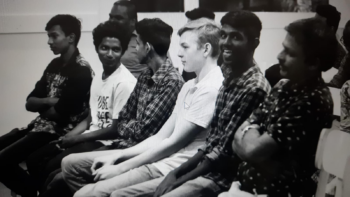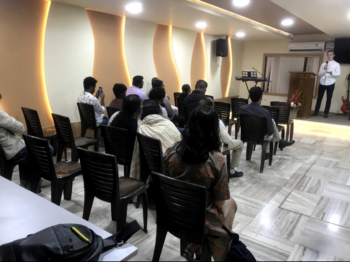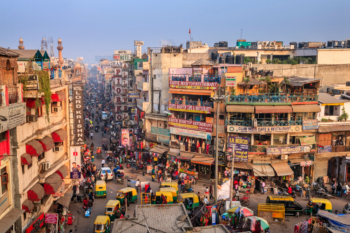 By Milo Haskour –
By Milo Haskour –
From Austin, Texas, 14-year-old Joshua Wacker gave up his First World privileges to risk his life as a missionary kid in Kochi, India.
“My family and I experienced our fair share of hardships: sickness, food poisoning, car accidents, betrayal, the passing of close friends, and a handful of near-death experiences,” says Joshua on his own personal website.
When they went to India, he knew he would land in a country of honking cars, scooters vying to get ahead of traffic, mooing cows and stray dogs. He didn’t know what sort of hardships he’d face. But Joshua kept faith and resolved to not lament about missing life in Texas.
 “It wasn’t necessarily my choice to leave comfortable Austin, Texas, for Third World India,” Joshua says. “But it sure is one of the best things that ever happened to me.”
“It wasn’t necessarily my choice to leave comfortable Austin, Texas, for Third World India,” Joshua says. “But it sure is one of the best things that ever happened to me.”
Joshua, his mom, dad, and sister, left with a few suitcases, one-way tickets, and a great church backing them up, in September of 2018. They stayed for three years.
“This was when I began my journey of learning how to adapt,” he says.
During his time in India, Joshua fell prey to many feelings. There were times he wanted to run away from the mission field and forget about the hard work and lack of luxuries.
 Typically, missionary kids don’t enjoy the lifestyle of their American counterparts. They live in relative poverty. They usually don’t get to play baseball, football or basketball. In many countries, they can’t go about on their own with friends because of crime and even kidnapping.
Typically, missionary kids don’t enjoy the lifestyle of their American counterparts. They live in relative poverty. They usually don’t get to play baseball, football or basketball. In many countries, they can’t go about on their own with friends because of crime and even kidnapping.
Joshua says he didn’t face crime or kidnapping. But he didn’t feel like he belonged.
In the midst of the alienation, he made a radical decision to simply put his trust in God and have a good attitude, knowing that India wouldn’t be his forever home.
 “Most importantly, we trusted God, and believed that the safest place to be is in His will,” Joshua says. “It can be intimidating when adapting to something new, whether that be a new job, a new church, moving to a new city or country, or even getting used to new in-laws.”
“Most importantly, we trusted God, and believed that the safest place to be is in His will,” Joshua says. “It can be intimidating when adapting to something new, whether that be a new job, a new church, moving to a new city or country, or even getting used to new in-laws.”
Joshua learned to observe and assimilate more than speak up and criticize. “There’s a reason why we have two ears and one mouth – to listen more than we talk,” he says.
“We immediately started meeting new friends, trying all kinds of authentic Indian food, learning the language, exploring the city and surrounding areas, and getting involved with the community,” Joshua recalls.
Immersing himself in the culture, Joshua grew comfortable with the throngs of people, the pollution, the blaring horns and animals wandering the streets of Kochi, a city on the Southwestern coast of the Indian sub peninsula in the state of Kerala.
“You can’t be afraid to stand out or step out. You must participate,” Joshua says. “You must do what they do.”
As always, you don’t want to compromise your morals nor participate in things that contradict your way of living, he cautions.
“Sure, maybe some of the Indian food looked (and tasted weird), or the Malayalam language sounded funny, or they didn’t drive safely,” Joshua says. “But we didn’t use that as an excuse to do nothing, to play it safe.”.
Ultimately, Joshua came to realize he was enjoying the “best food of his life” though sometimes he got food poisoning.
Joshua got into cooking as a result of his time in India. He likes spicy.
“Being able to step out and participate in new cultures is crucial in the journey of adaptation,” he says. “At times it can be uncomfortable, or even unsafe. But it is better than staying in your comfort zone and being the exact same person you were six months ago.”
The immersion was coming to completion.
“After spending 1-2 years in India, I felt like I was becoming a part of the country.,” he says. “I was able to understand and connect with the people in a deeper way. I was getting more fluent with the language. Many of my close friends started to feel like family. It felt like I lived there for my whole life.”
After three years of service abroad, Joshua and his family returned to Texas. His father, Jeremiah Wacker, served as a traveling evangelist. Joshua, now 19, is taking a college class and runs a detailing business and a windshield restoration business.
It had taken him a while to get used to India. Now the adaptation process had to be reversed. He had to get used to America because he felt like he belonged to India.
“Saying goodbye to all of our close friends we had made in the last three years was one of the hardest things for me to do. India felt like home to me. I felt like I belonged there,” Joshua says.
After two years in Austin, Joshua had the opportunity to go back and visit India.
“When I got to India, it felt like I had never left – like everything I had learned was still embedded in me.,” he says. “It felt as if I was visiting home again.
One of the things missionaries have to adapt to is the way the rest of the world drives. The Wackers experienced two accidents. In the first, a scooter crashed into their car. It wasn’t their fault, but the scooter was totaled.
In the second, Jeremiah swerved to avoid a dog in the road on a dark night. The car rolled, but Wacker and daughter walked away without a scratch. They were significantly traumatized but not physically harmed. They Ubered for eight months afterwards.
What advice does he give to a Missionary Kid about to go abroad?
“It will be the best thing of your whole life. Make the best of it. You’re going to miss it when you get back. It’ll go by like a breeze,” Joshua says. “The best part and super cool is just being able to experience life over there. Learning how others think makes you a more valuable person. If you can adapt to overseas, you can adapt to anything.”
To know more about a personal relationship with God, click here.
Milo Haskour studies at the Lighthouse Christian Academy in Los Angeles.



